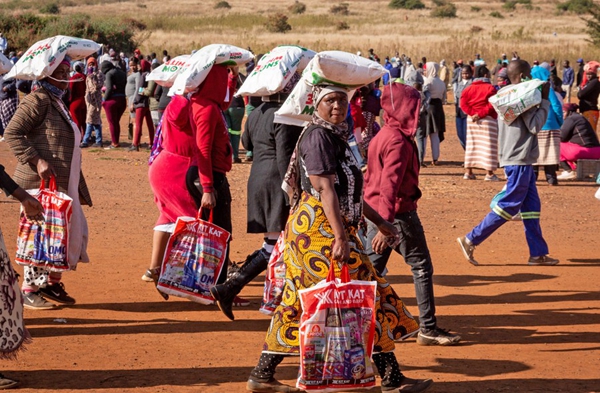
People receive food provided by charity groups in Pretoria, South Africa, May 20, 2020. [Photo:Xinhua]
The African Union (AU) said the combined aftershocks of the COVID-19 pandemic and the Ukraine conflict are "profoundly affecting" growth prospects of the African continent.
According to the AU, the combined impact is, eventually, leaving AU member states with little fiscal room to satisfy the needs of their population and meet their financial commitments to the continental bloc -- African Union.
The statement came as the AU's Committee of Fifteen Ministers of Finance (F15) held a two-day high-level continental meeting that runs until Tuesday, under the theme "Beyond COVID-19 Pandemic and Russia-Ukraine Conflict: Enhancing the Resilience of African Economies and Financial Sustainability of the AU."
The F15, which meets at least twice a year to take stock of the implementation of decisions on financing the AU, is tasked to address specific emerging situations with a view to identifying appropriate strategies and remedial measures including cross-checking the general coherence and consistency of decisions.
The F15 is currently meeting on the backdrop of COVID-19 and the Russia-Ukraine conflict to review the financial sustainability of the AU in the context of ongoing budget and financial reforms post-pandemic and the conflict, as well as to propose enhancements to the financing of the AU.
Monique Nsanzabaganwa, Deputy Chairperson of the AU Commission, addressing the high-level meeting said the ongoing Russia-Ukraine conflict further exacerbated the COVID-19 pandemic's widespread impact on African economies, witnessed through the continent's food insecurity, severe price distortions in the commodity markets as well as disruptions in the supply chain of petroleum products and fertilizer.
She called on African finance ministers and experts to deliberate on ways of building resilient economies that can withstand current and future economic shocks on the magnitude of the pandemic and the Ukraine crisis.
She further emphasized the need to assure the financial sustainability of the AU, which she said is detrimental to the success of various continental projects spearheaded by the AU.
The 55-member pan African bloc said it needs adequate, reliable and predictable resources to implement its programs so as to achieve Africa's development and integration goals.
According to the AU, the two-day meeting will devise innovative bounce-back strategies. A declaration is also expected to be adopted at the end of the meeting.
Successive AU summits have since 2015 taken financial reform decisions to ensure there are sound and predictable finances to address the historical challenges of the AU, mainly unpredictability and volatility of its revenues, dependence on external partners, reliance on few member states, as well as its growing budget.
In 2016, the Kigali Decision on Financing of the Union adopted the implementation of 0.2 percent import levy. According to the AU, as of December 2020, there were only 17 African countries at various stages of domesticating the Kigali Decision.


